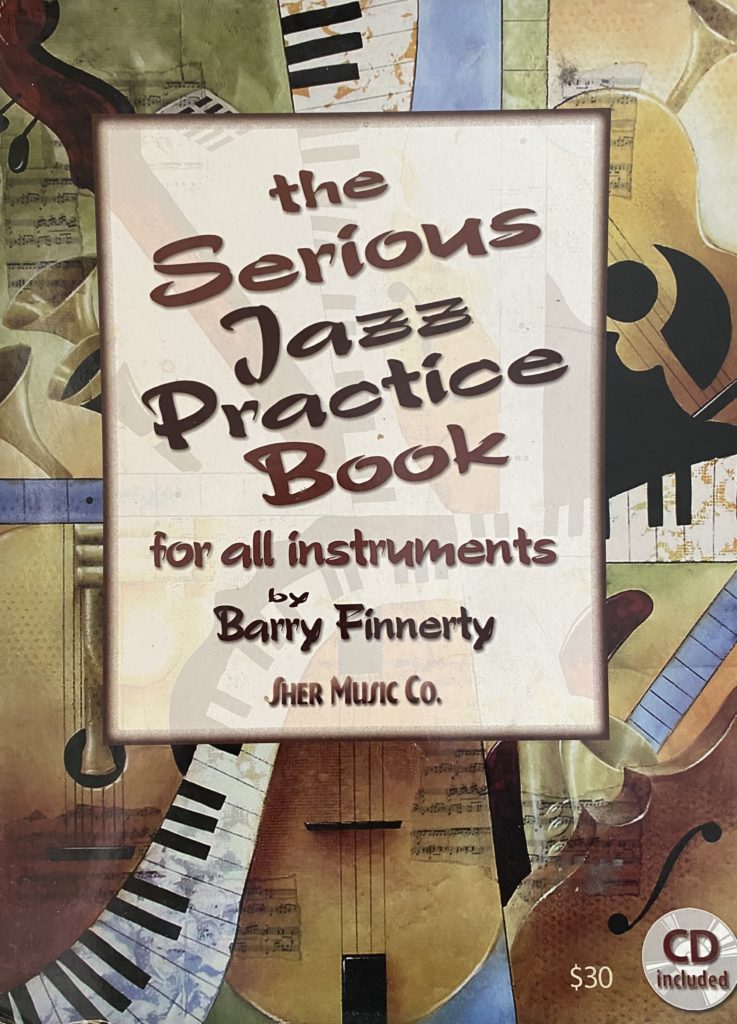
Barry Finnerty has played and recorded with so many renowned musicians including Joe Farrell, Billy Cobham, Chico Hamilton, Taj Mahal and was the guitarist for classic recordings from Miles Davis, the Brecker Brothers and the Crusaders.
In this book from 2006, we get a lot of useful ideas for (as Barry describes it), serious jazz practice!
The book is divided into 8 sections:
- Foreword
- Section 1 – Diatonic Exercises
- Section 2 – The Pentatonic Scale
- Section 3- Arpeggio Studies
- Section 4 – The Whole Tone Scale
- Section 5 – The Diminished Scale
- Section 6- The Chromatic Scale
- Appendix
In each of the sections, you get different interval, triad and related studies that explore not just the diatonic aspect of the scale but also with additional chromatic approaches. These kind of embellishments really help as some players may not have examined chromatic approaches as systematic as what Barry as laid out here.
I like how Barry gives useful practice suggestions & tips for both students and teachers who want to work on this material with their students. He also mentions some ways to vary the exercises beyond 8th notes.
It’s also worth noting that Barry has written out these exercises in C, so you have to transpose them accordingly into other keys and adapt them to your instrument’s range.
For guitarists, I suggest using this book alongside a method book or fingering system of your choice. I’ve tried the exercises with Jimmy Bruno’s five fingerings & that to me is a good combination to begin with.
Since this is a book for all instruments, please do note that there are no guitar fingerings or tablature included. You will need to do the work!
You also get a CD (or download) with audio tracks that help you understand the materials even better. The examples demonstrate some of the ways you could transform the melodic ideas into parts of your solo. (By the way, the closing improvisation that Barry does is very cool. Make sure to listen to that when you get the book!)
Talking about approaches to use the book, Barry emphasizes the importance of practicing the scales as music. He encourages you to hear the sound of each note of the scale in terms of the function.
In conclusion, this is the kind of book that you want to permanently leave on your music stand for daily practice. Any of the exercises that Barry has shared could easily be hours of practice. As I mentioned earlier, this book is a great supplement to any existing method book or scale fingering method that you’re working on. It’s great to help you develop your technical facility, ears and ingrain different melodic possibilities for composition and improvisation. This is all a lot of work, but it will certainly reward the patient musician.
Pros: Great book, well organized, LOTS (and I mean lots) of ideas for practice.
Cons: None. Except be warned that since this is a book for all instruments, there are no guitar fingerings or tablature included.
TLDR: For the serious musician, this might be the book you’ve been looking for so that you don’t run out of sequences, melodic ideas and practice material. It’s really good.
[Where to buy the book]
You can get the both the physical book & ebook versions here: https://www.shermusic.com/1883217423.php
[Review Archive]
I wrote a lot of other book, course and video reviews too.
Check out the rest here:
[Read more reviews]
[Submissions for Review Consideration]
- Are you an author who wrote a jazz, guitar or music book?
- Have you created a DVD or an online video course or subscription based website?
- Would you like me to review your book/course?
Please send me a message at azsamad3 at gmail.com with:
For courses: a link to the course/video/product + access info etc.
For books: a link to the book (Dropbox) or PDF attachment (if it’s small) for review consideration.
Depending on whether I dig the book/course, I’ll let you know if I do plan to review it!
I cannot guarantee a review for every submission & if I’m not too into it, I may opt not to review it. I mean, it’s better to get a good review that for me to write a bad review just because it’s not a match for the kind of stuff I dig right? :p
NOTE: All reviews reflect my honest personal opinion so be aware that I will point out both cool Pros and Cons that I see in the work. You dig?
Leave a Reply